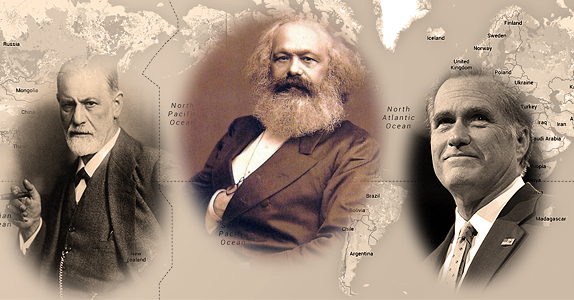
Taxation Without Representation!
That was the clarion call the American colonists employed to rouse their fellows against the British in 1776. The American Colonies were important for the nascent capitalist economy in England, because they represented not only a growing market for their goods (tea was only one of many products exported to America), but also a new source of natural resources to bring back to the homeland and turn into goods to be sold back to the colonists. The British had already monopolized tea imports from China and were reaping fortunes selling it, not only in their own country but to the American colonists as well.
My point, without belaboring the political ramifications, is that capitalism has always been in search of new, expanding markets; today, those same colonies, now grown into a nation, are utilizing similar tactics—called “globalization”—that the British Lords arrived at 350 years ago.
Marx, who was analyzing the markets of England 145 years ago, said very clearly in the 3rd volume of Capital, “Developing the material forces of production and creating an appropriate world market is the historical task of the capitalist mode of production.”
Workers who have lost their jobs to the Mitt Romneys of the nation, who have seen their former work places moved overseas, in some cases lock-stock-and-barrel, yet still maintain that capitalism is the best way to live, only demonstrate how firm the hold over their reason this system has achieved.
As Yves Smith wrote recently on Truthout, “As income disparity has widened enormously and class mobility has eroded, Marx’s idea of class warfare seems particularly apt. But as long as there is a sufficiently large remnant of the American middle class, still socialized to identify with the established order, no matter how beleaguered they are, it’s hard to see how any organized, large-scale uprising could occur.”
The obverse is also true, class conflict is a subject that always makes the rich uncomfortable and they are understandably delighted when the poor are also willing to pretend that it does not exist.
As Marx has shown, it is the historical task of capitalism to create “an appropriate world market,” and this has been true from the start of the Industrial Revolution. Ironically, the colonies of America were founded and developed in this light by Great Britain, to expand their monetary hegemony over foreign markets and natural resources.
This is what capital is currently attempting to do in the Far East. In 1925, James Joyce, in a prescient mood, wrote: “The West shall shake the East awake…while ye have the night for the morn…” We have collectively done this, beginning with Admiral Perry in 1854, and then Nixon in 1972, and as I write our own president is in Asia reassuring our trade partners, no doubt brokering some deals in our name.
But this global movement for cheap wages and cheaper goods has affected every purchase one makes at stores everywhere; unfortunately, it also affects one’s wages, job possibilities, and has created an uncertain future for the coming generations. And for those dreamers who might fantasize that things will go back to where they were, nothing will ever be the same. This is not the best of all possible worlds—those worlds have disappeared.
Of course the system selects what is important—the schools, the media, even one’s parents—so that this analysis is buried in rhetoric or diversions that take people’s minds off their ills. Art and culture, seen through Freudian eyes, are classified as sublimation, draining away the energies that could be put into changing the world and making things better. The billions of hours spent watching mindless drivel on television, or in the movie theaters, could be spent instead organizing to make life better. Freud, in a profound mood, calls them the “intoxicating media” and says, “with the help of this ‘drowner of cares’ one can at any time withdraw from the pressure of reality…” He concludes that this is a useless waste of energy “which might have been employed for the improvement of the human lot.”
The Tea Party, which has received much criticism from the liberal media, has been trying to staunch the flow of money into wasteful and unnecessary government projects. They haven’t handled this well, and though woefully inadequate, it does reflect a minor movement of people who have awakened to the peculation rampant in the halls of government.
This misspending of public monies, accompanied by massive fraud and graft, can be stopped, but only with a great resolve to do it, a will to protect our futures and to fight for what is our right in an open and free democracy. But those rights require us to put on the war paint that the original Tea Party participants wore that cold December night in 1773. They acted to throw down the gauntlet to the king—we must do it to prove to ourselves that we know and understand that if we do not, the future will grow more and more irresolute for every one of us.
(Photo of Romney by Cage Skidmore)

June 24, 2014